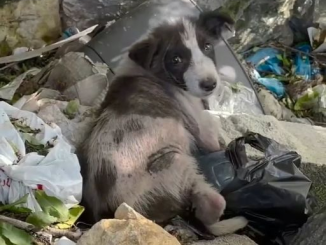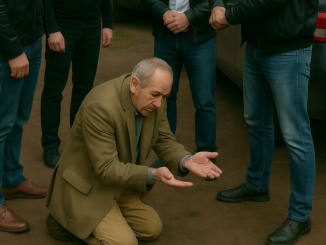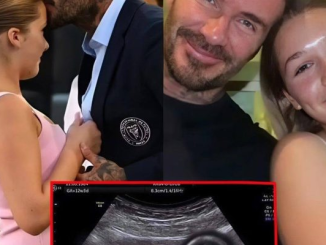I thought I was prepared for the moment. Skin-to-skin, NICU buzz all around me, heart racing like I’d just sprinted a marathon in socks. But nothing—and I mean nothing—could’ve prepared me for what it felt like to hold both of them against my chest. Two tiny humans. My humans.
They were so small, barely heavier than soup cans. Warm, squirmy, and somehow already completely different—one grunted like a baby dinosaur, the other just nuzzled in like she knew this was where she belonged.
I remember laughing and crying at the same time. Mask pulled down, gown halfway off my shoulder, looking like a mess but not caring at all.
Then the nurse leaned in.
She smiled, gently adjusted one of the wires, and said, “You’re doing great, Dad. You’ve got the touch.”
I nodded, still half in a daze.
Then she added, almost too casually, “By the way… they’re not technically identical.”
That snapped me out of it.
“What do you mean? They told us they were—like, from the same egg and everything.”
She paused. “Yeah, that’s what we thought at first. But we ran the full panel after the transfusion issue. One of them has a marker the other doesn’t.”
My arms suddenly felt heavier.
“Wait,” I said slowly, “what kind of marker?”
She gave the kind of look that says she wasn’t sure if she should keep talking—but then she did.
“Blood relation… might not be 100%.”
My heart stopped.
I blinked, trying to make sense of what she’d just said. The words seemed to hang in the air between us, like they didn’t belong in the same sentence, let alone my reality.
“Wait… what do you mean?” I asked again, my voice quieter this time, more confused than ever.
The nurse’s smile had faded, replaced by a more serious expression. She took a deep breath, probably wondering how to break the news. “It’s not that complicated, really. What I’m saying is, one of your babies might not share the same biological father as the other.”
I froze. The sound of the NICU machines humming in the background seemed to grow louder. I could hear the faint beeping of the heart monitors, the soft rustle of medical papers being shuffled around, but none of it mattered anymore. All I could hear was the nurse’s words echoing in my head.
“What?” My voice came out in a whisper. “How could that be? We—everything was checked! We went through IVF. Both of them should be… they should be genetically the same.”
The nurse took a deep breath and carefully placed a hand on my arm, her eyes softening. “Sometimes… these things happen. You might have had what’s called a superfetation. It’s rare, but it’s possible. It means one of the embryos could have been conceived later than the other, by a different sperm. The results from your IVF cycle pointed toward the idea that both embryos would be genetically identical, but in cases like these, we occasionally find discrepancies in the markers. It’s just something we have to look into further.”
My mind was racing, trying to process what she was saying. It was as if the ground beneath me was shifting, like my entire world was suddenly built on shaky ground. These two little miracles, my twin girls, might not even be from the same father?
The idea was absurd, wasn’t it?
I looked down at them, still nestled against my chest, their tiny hands gripping my gown like they were clinging to the only security they knew. My heart clenched with a deep, raw fear.
But then… there was also something else. Something that felt strangely calming. The thought that, no matter how this came about, they were my children. I’d been there for every single ultrasound, every procedure, every step of the process. I was their father.
“Do you… do you think they’re mine?” I asked, still struggling to put my thoughts into words.
The nurse paused for a moment before responding. “I can’t say for sure yet. We’ll need to run a paternity test. But I know one thing: whether they share DNA with you or not, you’re their father. That bond, the one you’re feeling right now… that’s what matters.”
I didn’t know if that was meant to comfort me or if it was just what she was trained to say to avoid causing more confusion. But right then, I wasn’t sure of anything. My head was spinning, my heart in turmoil. I just wanted to hold my babies and make sure they were okay. I wanted everything to be perfect. But was it?
A few days later, after the hospital ran more tests and the paternity panel came back, I sat with my wife, Sarah, in a quiet room. We had been together for ten years, married for six, and IVF had been our only option for having children. Our journey had been long and difficult—years of heartbreak and hope—and now, here we were, holding our precious twins.
The room was sterile, the fluorescent lights buzzing overhead as the doctor entered. She was all business, flipping through her clipboard before meeting our eyes.
“Well,” she said, “the tests are in. It appears that one of the twins is genetically related to you, Mr. Davis. The other, however, seems to have a different biological father.”
Sarah gasped beside me, her eyes wide, her face pale.
I felt my heart sink, but at the same time, there was a weight lifting off my chest. It wasn’t as if I was looking for reassurance, but in that moment, all I could think about was how we would handle this as a family. How would I tell Sarah? What would this mean for our family?
“I can’t believe this,” Sarah said, her voice trembling. “How could this happen?”
The doctor sat down across from us. “Superfetation is incredibly rare, as I mentioned before. It’s a scenario where a second egg is released and fertilized after the first one, but within the same cycle. In your case, the first baby was conceived using your sperm, Mr. Davis, but it seems the second one was conceived with a donor sperm. I’m so sorry, but it’s the only explanation for the difference in the genetic markers we’re seeing.”
I was in shock, staring blankly at the doctor’s words. It felt like the room had gotten smaller, the air thicker. My mind couldn’t keep up with what was happening.
Sarah turned to me, her face a mix of disbelief and fear. “How did this happen? We were so careful—why didn’t we know?”
“I don’t know,” I whispered. “I don’t know.”
I could see the panic in her eyes. She was hurt. Confused. But there was also something else there—an almost desperate need for clarity. And suddenly, it hit me like a ton of bricks. We had been through so much to get here, and now it felt like the rug had been pulled out from under us.
But before I could say anything, the doctor added something else that caught my attention.
“Mr. Davis,” she said gently, “the donor sperm we used was actually from someone who was also an anonymous donor for other families. We’ve cross-checked, and it turns out that several other children conceived through the same sperm bank share DNA with your second twin. If you’re open to it, we could facilitate a connection. It might help everyone involved.”
My jaw dropped. What was she suggesting?
I looked at Sarah, and for the first time, I saw a flicker of something in her eyes—something that wasn’t anger or confusion. It was understanding. Compassion. Because we both realized, in that moment, that this wasn’t a catastrophe. It was just a twist of fate.
We made the decision to reach out to the other families who shared the same donor, and over the following months, a surprising connection formed. Our daughter, the one who wasn’t biologically mine, was a part of a much bigger, beautifully complex family—one that I hadn’t expected but had come to embrace in ways I could never have imagined.
The karmic twist, as it turned out, wasn’t just about the donor sperm or the unexpected circumstances. It was about the relationships we built as a result. The bonds we formed with the other families, the shared sense of community, and the beautiful truth that sometimes life doesn’t go as planned—but that doesn’t mean it’s not just as beautiful. Our twins grew up surrounded by love, not just from me, but from a network of people who were all bound together by something bigger than biology.
So, to anyone out there who’s ever felt like life threw them a curveball, remember this: Sometimes the unexpected turns lead to the most incredible, life-changing moments. Embrace the unexpected, because what feels like a twist of fate might just be the beginning of something beautiful.
If this story touched you, please share it with someone who might need to hear it. Like and comment below if you’ve had your own unexpected twists in life that turned out for the better. Life has a funny way of working out.






Leave a Reply